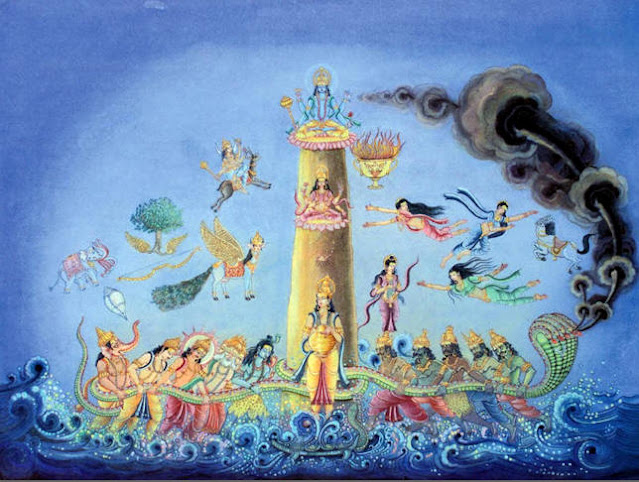CHAPTER XXVI
(AN ACCOUNT OF PIRTHU AND THE CHURNING OF THE OCEAN)
Janamejaya said:—O Brahman, when egoism and ignorance thus prevailed all over the world what did the people do (1)?
Vaishampāyana said:—In order to look after the work of adminstration Prajāpati, along with the Rishis, installed Vena's son Prithu on the throne (2). When the Tretā Yuga set in the people spoke amongst themselves:—"He is our most excellent king born (3). He will grant us livelihood, protect the Brāhmanas and all creatures in satisfaction of duties entrusted to him by the Lord" (4).
In the meantime, exhausted with the practice of various religious regulations the gods were taking rest on the table land of the mount Gandhamādana (5). Thereupon when the spring set in gods and Dānavas, smelling fragrance from all sides, were highly pleased. They thought:—"The fragrance of flowers scattered by the wind is highly charming and delightful therefore the fragrance of every earthly object is most excellent." Smelling that fragrance the Daityas were a little surprised in the beginning. Afterwards being delighted they attained to most excellent felicity (6–8). Excited with that smell they all said in a body: "Such is the power of every flower: we do not know what will be its fruit (9). Various modes of action are to be ascertained by inference. By the power of this understanding men perform auspicious and inauspicious deeds (10). With the powerful mount Mandara capable of assuming forms at will we will grind the herbs in water[1] (11). We will churn the ocean with great force, drink ambrosia and in a body make ourselves ready for destroying Avidyā or ignorance (12). The great force Vishnu, whom we worship, will be our guide (in Yoga); and although living with Ripus (passions) still we will conquer them and enjoy Dyuloka and Bhurloka (13). With roots, leaves, branches, flowers and fruits[2] we will carry ambrosia to earth. (14)". Having spoken thus about the shaking of the mount Mandara the Daityas extracted all the herbs grown on the mount Gandhamādana. And then they ran for uprooting the mount Mandara and agitated the earth. The Dānavas, born in the race of Danu, could not uproot the mount Mandara. Their knees bruised they fell down into the hollow of the mountain (15–17).
[1] The esoteric meaning is:—The mount Mandara means true understanding; Payas means Jnana or knowledge and Oshadhis—bodily attachment. The meaning is that by means of true understanding we will drown bodily attachment in true knowledge.[2] That is, being united with father, wife, brothers, children etc.
Thereupon having dissipated their sins through ascetic penances and controlled their self through proper understanding they bent their heads down and sought refuge with Ishwara (18). Informed of their mental desire the omniscient and self-controlled Brahmā, who can go every where for the well-being of all the worlds, said in an invisible voice (19-20). "Let the Adityas, Vasus, Rudras, Maruts, gods, Yakshas, Gandharvas and Kinnaras be united and uproot the mount Mandara and possess the herbs the very essence of the Himalaya" (21–23). Hearing those words in the presence of all, the Daityas, endued with the strength of arms, multiplied themselves into many with mind and words near the ocean of salt of water where Pushkara was placed by all the Devas and Dānavas (24-25). Having converted the mount Mandara into the churning rod and Vāsuki into chord they churned the ocean of salt water with the herbs for thousands of years. With the mixture of water and herbs arose ambrosia in the form of milk (26–27). Possessed by avarice and anger the Asuras pilfered that ambrosia. Thereafter arose Dhanwantari, wine, Sree, Koustava jewel, the clear moon, the beautiful horse Ucchaishravā and then milk. In order to take it the Devas said to Rāhu:—"None, amongst the Daityas and Danāvas, has drunk this ambrosia."
Thereupon with discus Hari cut off Rāhu's head. Earth himself snatched away from Indra's hand that nectar-like Jnāna which even the departed manes and Munis have not enjoyed perpetually. Urged on by the Vedic phrases and accepted the discipleship the Earth stole away that nectar of knowledge (28–32).
Source: https://archive.org/details/AProseEnglishTranslationOfHarivamsh
| Previous | | Source | | Tamil Translation | | Next |
